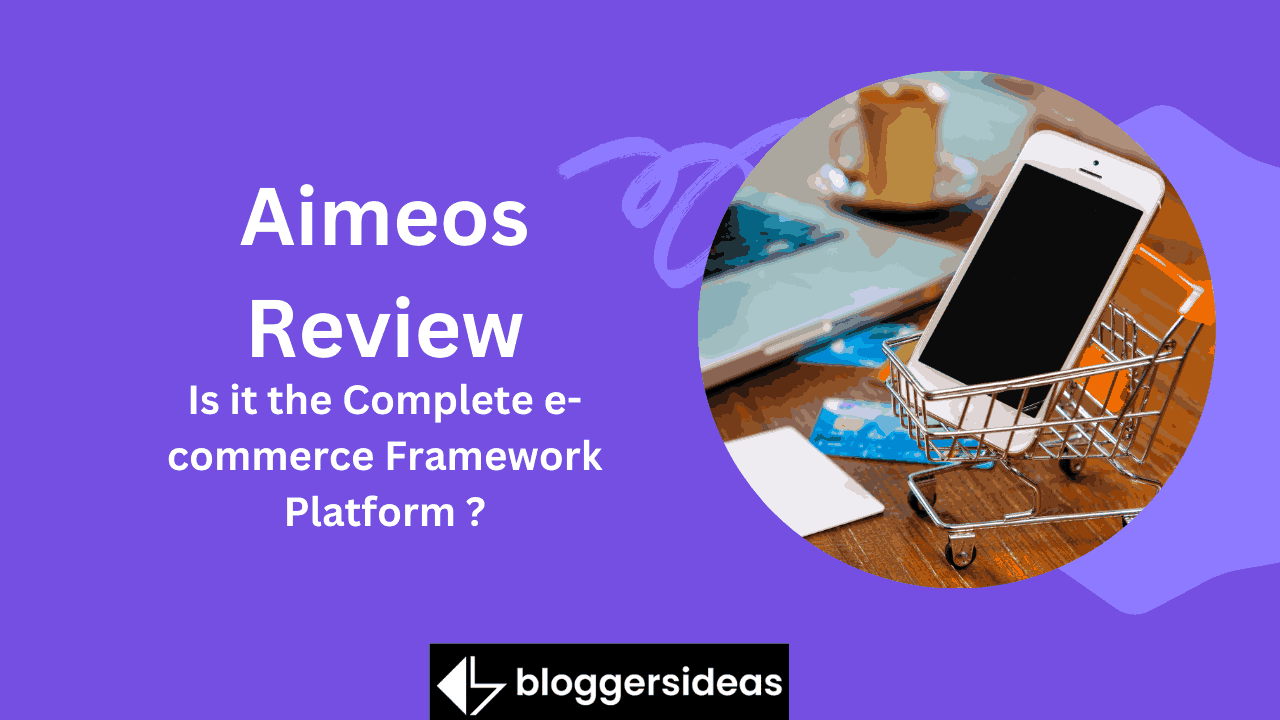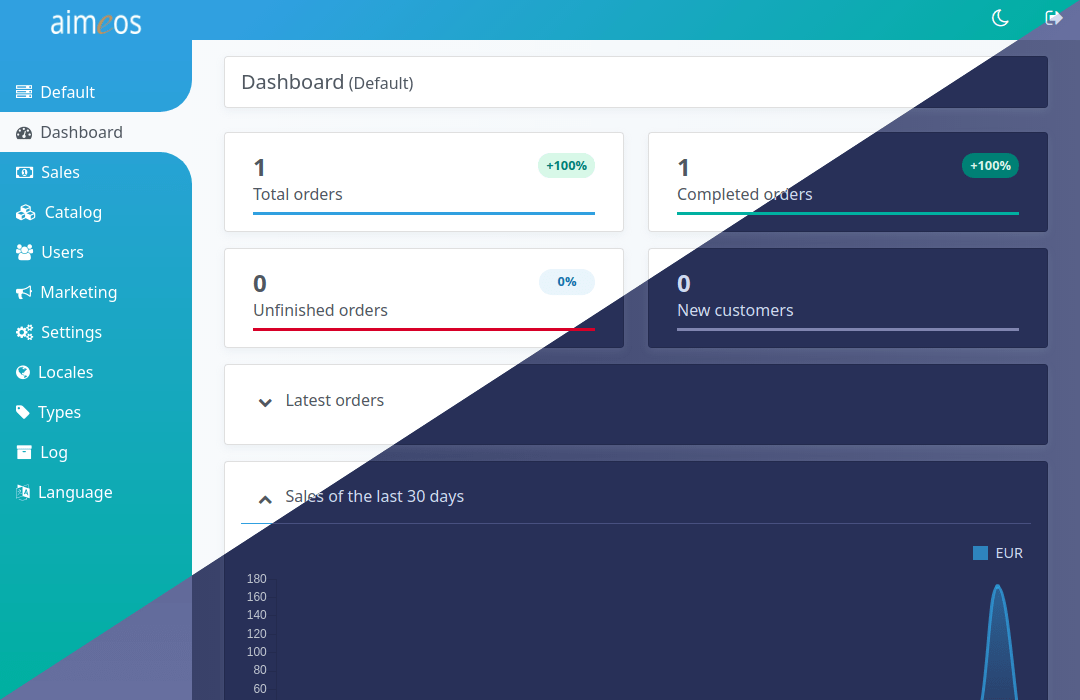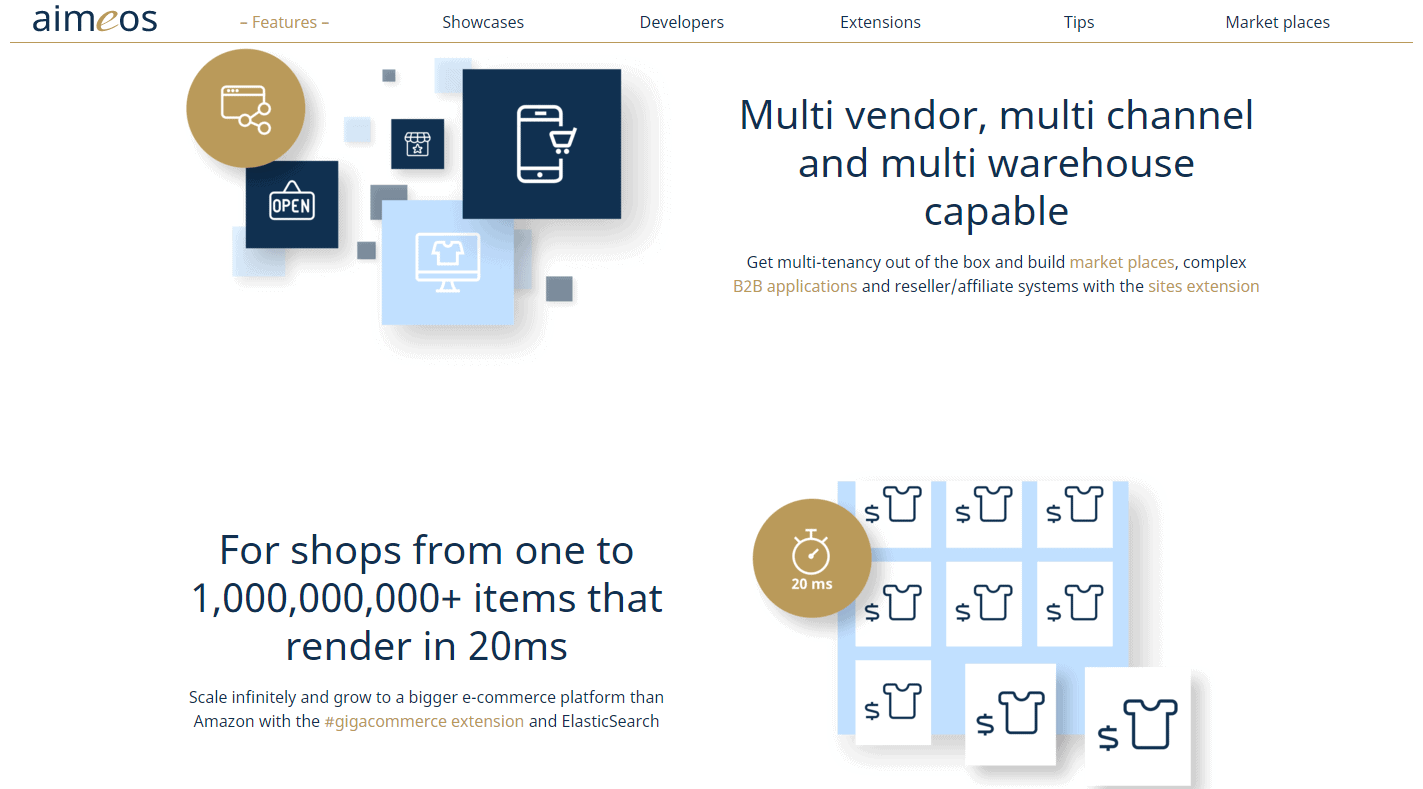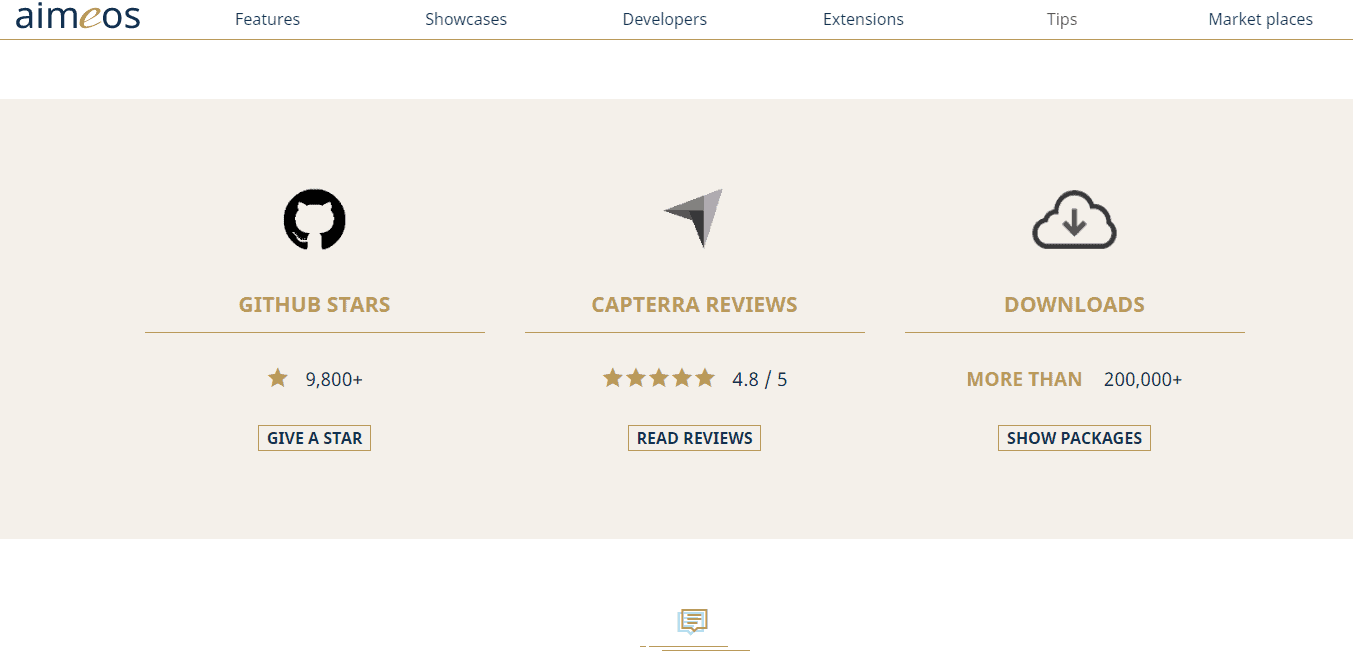If you are already using Laravel, Symfony, or TYPO3 and plan to use it as a base for your eCommerce business, then you should evaluate existing extensions to speed up your time-to-market as building a complete platform from scratch is a very time-consuming task.
To find the most reliable platform that allows you to grow your business, we did a comprehensive review of Aimeos, a powerful e-commerce extension for Laravel, Symfony, and TYPO3 that natively integrates into leading PHP frameworks and content management applications.
What is Aimeos?
Aimeos is an extremely popular PHP e-commerce framework that is available as Laravel package, Symfony bundle, and TYPO3 extension and seamlessly integrates into the named frameworks and applications.
It allows you to set up, customize and adapt everything according to your needs, so it’s not only suitable for standard online shops but also for highly customized e-commerce applications.
Aimeos is a feature-rich e-commerce framework designed for custom shops and e-commerce applications of any complexity. The platform aims at blending performance with speed, strongly focusing on providing scalable solutions for businesses of all sizes including businesses with 1+ billion articles which is more than Amazon currently has. You can use your existing platform to sell your products or services and grow without limits.
- Also, Read ~ Guide to commerce SEO
What Can You Do With Aimeos?
Aimeos offers your customers a smooth online shopping experience with full integration into your existing ERP, CRM, and CMS systems. You can also use Aimeos in any business segment or industry division to sell goods or services on behalf of your partners, allowing you to create
- Custom online shops
- Scalable SaaS platforms like Shopify
- Marketplaces bigger than Amazon
- Compex B2B eCommerce applications
- Reseller portals of unlimited levels
- Content commerce platforms
Aimeos Technical Details
Here is a list of technical details about Aimeos that you should know about:
Supported platforms
- Laravel
- Symfony
- TYPO3
Operating systems
- Linux
- Unix
- MacOS
- Windows
Web servers
- Apache
- Nginx
- IIS
Database servers
- MySQL
- MariaDB
- PostgreSQL,
- SQL Server
Programming language
- PHP 7.1+
- PHP 8.0+
Frontend
- Headless (JSON REST API)
- HTML
Supported Languages
- English
- Japanese
- Spanish
- Spanish (Argentina)
- Chinese
- Italian
- Dutch
- French
- German
- Hindi
- Portugese
- Russian
- Swedish
- Turkish
- Polish
- Bulgarian
- Ukranian
- Hungarian
- Danish
- Arabic
- Romanian
- Serbian
- Croatian
- Slovak
- Czech
- Estonian
- Persian
- Latvian
- Vietnamese
- Burmese
- Norwegian
Getting Started With Aimeos – Quick Start Guide!
In the Aimeos admin backend you can manage goods, categories, and other information, as well as set up payment/delivery services and basket rules. It’s the center for all shop-related content management.
How to log into your admin backend?
- Laravel : http://yourdomain.tld/admin
- Symfony : http://yourdomain.tld/admin
- TYPO3 : http://yourdomain.tld/typo3
The backend of TYPO3 includes a lot more than just the Aimeos admin interface. Look for the Aimeos Shop entry in the left navigation bar.
You’ll see the dashboard after signing in, which contains the most recent orders as well as some graphs related to sales, orders, and other reports. It’s a good place and starts to get a sense of what’s happened in the last few days or weeks:
If you wish to learn more and have access to more guides regarding the setup, onboarding, and use of Aimeos, then visit the Aimeos Documentation Section right away.
Build Your Custom Online Shop With Aimeos
Aimeos offers several useful options which you can experiment with to build an amazing custom shop for your eCommerce business within a few minutes.
Bundles, virtual, configurable, and highly customizable products
Sell products in bundles, add configurable options, or let clients build highly customized products out of the box. You can also sell services, documents, or access content on your website, in addition to physical products.
Headless API or classic HTML
Based on the JSON REST API, you can create your own mobile/progressive web application (PWA). Alternatively, a full-featured HTML frontend is available for starting your shop immediately.
Aimeos Use Cases
So, here is a list of some popular Aimeos use cases:
Marketplace and SaaS platform
The marketplace extension will help you design your own personalized multi-vendor marketplaces which are loaded with useful and performant features. All vendors will be able to create their own shops for customers of your area, segment, or target group. This marketplace extension enables you to create a tailored e-commerce platform that can be scaled according to your needs.
- Countless vendors in a single marketplace
Enable your clients to use a single basket with just one checkout and payment to purchase goods from any vendor in your marketplace. Each seller has access to his items ordered by customers, including the necessary order information, and they can update the status of the delivery themselves.
- Every vendor gets a fully functional shop
Give merchants their own store where they can only sell their own goods. Although still using the marketplace site, these vendor shops may also have their own domains. For each commodity, merchants with many warehouses may also add several stock levels.
- Create multiple specialized market places
Would you like to provide marketplaces of your own for various segments and merge all goods into the parent marketplace? With AIMEOS, you can build a multi-level tree of market places without performance loss and it provides you with fine-grained control over what is available at each level.
- Ideal for marketplaces having unlimited items
While being ultra-fast, AIMEOS and Laravel scale up your marketplace. Use a regular relational database like MySQL, PostgreSQL, or SQL server for 1+ million products and combine them with Solr for fast searching. For a nearly infinite number of items, use ElasticSearch and the Aimeos #gigacommerce extension.
- Use for drop-shipping
Add items can be inherited for drop-shipping. These items can be made available by your merchants in their shops and they can add your own pricing, texts, and images that are only accessible in their shops.
- Full-featured admin interface and permission handling
See complete information of all orders as the owner of the marketplace and assist vendors in the admin backend to handle their products and content. Restrict merchant access by assigning limited access rights to them so they can only manage products, prices, and other data relevant for vendors.
- Full support of the JSON: API
In all frontends, all marketplace features are equally accessible and administration is also possible using the web interface or the admin API.
Complex B2B e-commerce applications
Aimeos lets you build complex B2B e-commerce applications using Laravel or TYPO3, a powerful enterprise content management system that has been trusted and used by numerous companies as the ideal base for establishing and boosting your B2B sales. The TYPO3 CMS in combination with the Aimeos e-commerce extension will help you build multi-brand portals, complex B2B e-commerce applications, as well as content-driven e-commerce effortlessly.
- Multi portal, multi-channel and multi-warehouse capable
Build multi-brand portals, websites for each country you are operating in, or various sales channels from one source. It is possible to inherit and enrich products and other data through individual prices, texts, or pictures.
- Customer or customer group-specific products, prices, and more
Display individual prices, products, and categories with the customer group extension for each customer group or customer. Also, for each product and product option, an unlimited number of quantity-based prices are possible.
- Complex process flows and shipping calculations made easy
Easily integrate your B2B e-commerce application with ERP, PIM, document or order management, logistics, and other systems into your existing environment. With full support for complex business rules, Aimeos supports fetching/pushing data from/to various systems.
- VAT handling for B2B and/or B2C taxation
Check the VAT-IDs automatically in the EU VIES system and calculate taxes automatically with the “vatcheck” extension. Countries with multiple taxes on the same product are also supported (e.g. local and state taxes).
Aimeos Vs Magento – A Quick Comparison
Are you unsure if Aimeos or Magento is the better e-commerce solution? We compare Aimeos and Magento in this section to see which eCommerce Software product is the better choice. You should look into the details, such as the available resources, pricing, plans provided by each vendor, and more.
Features
AIMEOS
- Data Security
- Email Marketing
- Discount Management
- Inventory Management
- Kitting
- Mobile Access
- Multi-Channel Marketing
- Multi-Store
- Promotions Management
- Reporting/Analytics
- Reviews Management
- SEO Management
- Templates
- eCommerce Integrations
MAGENTO
- Alerts/Notifications
- Cataloging/Categorization
- Discount Management
- Inventory Control
- Mobile Access
- Reporting/Analytics
- Returns Management
- SEO Management
- Shipping Management
- Website Management
- eCommerce Integrations
What do customers think?
When making comparisons between products and services, the most important and insightful source of information comes from customer reviews and feedback posted in online forums. Capterra is one of the most trusted and reliable sources to find authentic customer reviews about software and applications.
It allows users to post their views and opinions about a particular software and they verify their sources. You will often find people sharing the pros and cons of the software along with some additional feedback.
Using Capterra, we compared Aimeos and Magento, two leading platforms for eCommerce, and found the following results and feedback by a head to head comparison:
| Particulars | AIMEOS | MAGENTO |
| Average Ratings | 4.8 ✭ | 4.3 ✭ |
| Customer quotes according to Capterra | ||
| PROS | “It works very good, never had big problems and the performance feels really, really good.” | “Was easy to learn and train others with, love the ability for extensions galore.” |
| “A very good shop framework / system with a great feature set.” | “They also had a pretty great selection of themes, both free and paid for, to work off of.” | |
| “The connection to several PHP frameworks is also good (TYPO3 is fine for me ;-)). The support is very good and fast.” | “There are so many add-ons and options available that it is one of the most comprehensive options. It is also great for our 10,000+ product catalog.” | |
| “I like the feature scope of the software. The support is very good, too.” | ||
| CONS | “I haven’t encountered any real problems until today.” | “Even then, the developer you have may struggle because the code can be complicated and confusing and online resources are often out of date or for the wrong version.” |
| “This was very stressful, and was the reason for which my team dumped it. Expensive themes: Magento is not as widely used as some other ecommerce CMSs.”
“The Magento store has caused a lot of software developers to leave the platform. Their pricing model is unfair.” |
||
| “The Magento store has caused a lot of software developers to leave the platform. Their pricing model is unfair.” | ||
| “Configuring the platform is frustrating, it needs high skills and is very poor in basic features. You need to install many extra modules and this could make you lose speed and stability.” | ||
**Sources:
- Aimeos: (https://www.capterra.com/p/181685/Aimeos/)
Performance
With typical memory usage ranging from 3-6 MB, Aimeos solutions are small and very resource-efficient. Contrary to that, Magento is large and heavy due to its architecture and requires powerful hardware including a dedicated hosting server.
Furthermore, scaling Magento over 50,000 products is difficult and requires a lot of hardware and additional caching. Aimeos on the other hand scales to 100,000+ products out of the box and can scale infinitely when using ElasticSearch and the #gigacommerce extension with only low hardware requirements.
It’s important to note that Magento is only a standalone framework, while Aimeos is an open-source library that can be integrated into Laravel, Symfony, or TYPO3 CMS or used standalone in a Laravel based online shop solution.
Supported Languages
Aimeos takes a healthy lead over Magento when it comes to multi-language support. Aimeos currently supports over 30 international languages whereas Magento only supports 6 international languages out of the box. For Magento, additional language packs are available from 3rd party vendors, some free and others you have to pay for.
Aimeos Vs Magento – Conclusion
Aimeos is a younger platform than Magento, and it takes a unique approach for e-commerce because it’s an open-source PHP library of e-commerce components that can be used to incorporate e-shops into various applications and frameworks such as Laravel, Symfony, and TYPO3.
Aimeos supports an infinite number of items with up to 100 000 products using regular MySQL out of the box and many millions using Solr/ElasticSearch. For online business owners using a regular LAMP stack, the Aimeos Laravel kit provides a full and tested shopping framework.
When it comes to integrations with third-party plugins, both platforms offer powerful extensions that can help boost your business online but for Magento, there are much more integrations available out of the box. Many of them are of mixed quality and they can affect the performance and stability of your shop in a negative way so it depends on what your preferences are.
If you are looking for a platform that allows you to seamlessly integrate your eCommerce store with popular PHP frameworks like Laravel and TYPO3, then Aimeos would be your GO-TO solution!
Flexibility & Customization of Aimeos
Aimeos has been developed to be developer-friendly as well as super flexible when it comes to customization. That allows developers to build highly customized online shops, marketplaces, and B2B portals using the Aimeos framework.
And when it comes to models, no other open-source competitor currently on the market can match Aimeos’ selection of design and customization choices. It is the perfect solution for eCommerce companies and entrepreneurs who want to see their e-shops grow and evolve.
Performance & Stability of Aimeos
In the fast-paced online market, every competitive e-commerce platform must concentrate on its performance to attract buyers. With Aimeos the response time for requests can be down to 40 ms to the first byte when using block-level caching.
Aimeos provides very reliable stability and efficiency for the features provided, and its SEO capabilities are also commendable and considered ideal for businesses of every size. Aimeos has completely configurable SEO, custom HTML meta tags, translatable URL segments, and Google readable product info.
Over 100 Payment Gateways With Omnipay
Since Aimeos primarily focuses on integrating into PHP frameworks seamlessly and they have ensured that every feature and functionality they are offering runs smoothly within all integrations. Hence, Aimeos has tied up with Omnipay to provide the best payment gateway support with your PHP integrations.
Omnipay is a PHP payment processing library focused on integrating hundreds of gateways. It has a simple and reliable API and is covered by unit tests.
Aimeos acknowledges the fact that running a good and profitable eCommerce business requires support for multiple payment gateways with good documentation. As a result, Aimeos has access to over 100 different payment gateways that are supported by Omnipay including:
- 2Checkout
- Adyen
- Alipay
- Authorize.Net
- Braintree
- CardSave
- Datatrans
- GiroCheckout
- GoCardless
- Klarna Checkout
- Mollie
- NetPay
- Oppwa
- PayPal
- PAYONE
- Paysera
- PayU
- Quickpay
- Sage Pay
- Sberbank
- Skrill
- Sofort
- Stripe
- WechatPay
- Yandex.Money
**And many more!
Content Commerce with Typo3 CMS
TYPO3 is a content management framework that is trusted and used by a number of large, well-known businesses and is the perfect foundation for content-driven e-commerce and multi-brand portals. TYPO3 is the right tool for you if you need to build, manage, and output any kind of digital content. You can start small and scale up quickly, but you’ll never need to adjust the Content Management System because TYPO3 adapts to your requirements.
After installing the Aimeos e-commerce extension, you can add Aimeos plugins like the product list or detail component to every page, even within existing content. This allows you to insert products into your landing pages where customers can buy them with one click.
Scale Up with #gigacommerce
- Powerful ElasticSearch
The ElasticSearch integration allows you to scale beyond your wildest dreams. Aimeos can use the database configured as DB by default. These are the settings you’ll need to use ElasticSearch for product and stock data:
- Infinitely scalable
With the #gigacommerce extension, Aimeos scales almost infinitely, from one product to 1 billion products and more! Your business can grow using the same platform, you can start small, keeping your initial costs low and scale-out as soon as your business grows.
- High speed
#gigacommerce superfast servers always ensure a superfast response time of your e-commerce platform usually ranging between just 100 and 300 milliseconds regardless of how many products are there in your online shop.
- Easy to integrate
The #gigacommerce extension is extremely easy to integrate with your online store and allows you to to store every data related to your product-related in ElasticSearch only.
- Also works for marketplace setups
You can scale your setups bigger than Amazon by using the #gigacommerce extension into your existing Aimeos marketplaces.
- Use with the JSON: API
Another big advantage of using the #gigacommerce extension is that it is fully compatible with the Aimeos REST API.
Quick Links:
- 9+ Best Amazon Feedback & Automation Software
- Jumper.Ai Review
- How To Nail E-commerce Marketing Automation with Omnisend
Why Do We Like Aimeos?
The key benefit of Aimeos is that, while providing ultra-fast response times, you can create something like Amazon and Shopify combined on one platform or complicated B2B portals and it is scalable to more articles than Amazon offers (currently ~560 million). As a base, you also have the option of many PHP frameworks.
- Multi-channel, multi inventory, multi-vendor support
- Build your own marketplaces or SaaS platforms
- Superfast rendering times (20ms) & response times (100ms)
- Can scale to one billion products and beyond
- Ability to sell products as a subscription with a recurring payment
- Supports vouchers and discount rules
- More than 100 payment gateways
- Great documentation
The only thing we think is a low point about Aimeos is that the learning curve of the platform is a bit steeper due its enormous feature set and extensible architecture.
Who Should Use Aimeos?
Companies that need an extremely flexible, scalable, high-performance e-commerce structure that can completely adapt to their requirements for online stores, marketplaces, and complex B2B applications. Furthermore, Aimeos is capable of scaling to any business size.
You can use your current business systems and let them function in harmony with Aimeos with the integrations developed within Aimeos.
The solution allows you, for example, to incorporate your CRM, ERP, document management systems or other data sources directly into the webshop, online store, or marketplace you developed using Aimeos, providing you with an eCommerce solution that integrates easily with your ecosystem and supports your business model and requirements.
Final Verdict – Should you use Aimeos?
Aimeos is a dependable third-generation solution for e-commerce users, developed to let you create online stores, complex B2B eCommerce applications, SaaS platforms, and marketplaces as flexible and scalable solutions that support any business size. You can integrate Aimeos into your existing application and boost your business to achieve faster growth.
Clear all your doubts! FAQs
🤔Is Aimeos customizable?
Yes. Aimeos offers high customizability within all integrations. You can easily add new software components, and remove or replace the old ones, or components can be expanded to your own applications and systems. In any framework or PHP application you have, you can incorporate the software components of Aimeos, adapt them to your own business systems, and speed up your development.
👉How good is the overall performance of Aimeos?
Aimeos is a platform that guarantees high performance and response times between 100ms and 200ms even under high load. Therefore, the solution will help you and sustain the pace and efficiency you need if you are launching marketing or advertising campaigns that produce a high number of site visits and page views. Aimeos boasts a response time of 162ms even without caching for 130-150 PI/second on decent hardware. To be clear, this response time includes network latency. Going by the numbers, these are considered to be astonishing results compared to other online shop platforms. Aided by the fact that Aimeos has the capability to scale up to 1+ billion items, makes Aimeos the ideal platform for TV advertising and other high-load scenarios regardless of the number of products.
👉Can I scale my e-commerce business using Aimeos?
The tools and integrations provided by Aimeos ensure smooth scalability. The platform will meet your hosting needs, whether you’re running your own eCommerce company offering a wide collection of products or selling just an individual product. Especially if your company is booming, you can add extra web servers. As well as transferring eCommerce data to other systems such as ElasticSearch or SOLR, you can also distribute the database over several servers, allowing you to scale both the frontend and the backend.
👉Is the #gigacommerce extension usable in all integrations?
Aimeos #gigacommerce can be easily integrated within all integrations incl. these leading PHP frameworks: • Laravel • TYPO3 • Symfony








